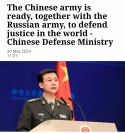China takes aim at EU’s planes and farmers as trade war brews
BRUSSELS — Beijing is warning the European Union it will hit its aviation and agricultural sectors unless Brussels pulls back from an impending trade war.
With the European Commission expected to slap tariffs on Chinese electric vehicles in the coming days, the Chinese Commerce Ministry has sent a five-page letter to EU trade chief Valdis Dombrovskis calling for a reset, according to a person with direct knowledge of the file.
A spokesperson for the European Commission confirmed to POLITICO that Dombrovskis had received the letter. “We are working on a reply,” the spokesperson added.
The letter, according to the person briefed, makes clear Beijing is annoyed with the increased pace of trade investigations launched by the EU executive in recent months, and calls for a truce to avoid further escalation.
However, China is not simply calling for a cessation of hostilities but is also signaling potential retaliation. This would "start" with aviation and agriculture, according to someone briefed on Beijing's approach, who was familiar with the letter.
The stakes could not be higher: Voters will elect a new European Parliament on June 6-9, and the Commission is likely to put off announcing the result of a nine-month investigation into Chinese subsidies to its electric vehicle manufacturers until after the results are in.
It’s not yet clear what level of import duties Brussels would impose, but analysts say they would need to rise to as high as 50 percent from the current 10 percent to level out the cost advantage enjoyed by Chinese EV manufacturers, led by BYD.
According to Rhodium Group the EU's imports of electric vehicles from China soared to $11.5 billion in 2023 from $1.6 billion in 2020, representing 37 percent of all EV imports.
Negotiated solution
In the letter to Dombrovskis, Beijing calls for a broad negotiated solution and fresh ideas to find solutions on trade disputes, following escalations between Brussels and Beijing affecting trade in everything from airport security scanners to medical devices.
Hitting agriculture could deal a considerable blow to a sensitive EU sector, with China being the third destination for the bloc's agri-food exports and representing 6.4 percent of the EU’s total agri-food trade.
The most serious aviation measures would likely target Airbus, the European aircraft manufacturer that is the largest supplier to the Chinese market. Beijing has threatened to target Airbus in the past, most notoriously saying it would not buy its planes if China's airlines were to fall under EU carbon emission trading rules.
In response to the investigation into subsidies of Chinese electric vehicles, Beijing in January launched an anti-dumping probe against European producers of liquor — hitting France specifically. French cognac producers fear that they will be the target of Beijing’s ire once the EU executive officially announces the electric vehicle tariffs.
Chinese President Xi Jinping met Commission President Ursula von der Leyen and French President Emmanuel Macron for three-way talks in Paris earlier this month, but the tone of talks was chilly and they only yielded a promise by the Chinese leader not to slap temporary duties on French cognac producers.
Just last week, China announced new sanctions on U.S. aerospace giant Boeing, on the grounds that it was selling weapons to Taiwan, which Beijing considers as a breakaway province.

